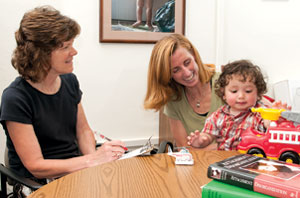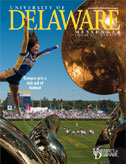Adoptive parents may need to intervene

RESEARCH | Children who live in orphanages or other institutions without a primary caregiver don’t have the opportunity to form an attachment to one person—a particular individual they can count on and who is engaged in their social, emotional, cognitive and physical development. When those children are adopted internationally, the task for their parents is especially challenging.
That’s the assessment of Mary Dozier, Amy E. du Pont Chair of Child Development in the Department of Psychology, who says such children often have problems paying attention, maintaining self control and developing bonds of trust with their new families. All these difficulties require intervention in order to avoid major behavioral problems as they grow up, she says.
Dozier, who is conducting a five-year investigation of the effectiveness of intervention, says her 15-year study of the development of young children in foster care and children who are maltreated but remain with birth parents showed that children often adapt in ways that help them cope. But, she says, those adaptations can have their own problematic consequences for relationships.
“We became interested in children who are adopted following institutional care because they have typically experienced more extreme conditions than children in foster care and in maltreating birth homes,” Dozier says. “The age at which children are being adopted is becoming later, and children have adapted in ways that make it harder for them to change.”
She says infants and toddlers are “designed” to have primary caregivers on whom they can rely.
Amy Lynch, who earned a doctorate in biomechanics and movement studies at UD this year, says her adoption of an 18-month-old boy, Aslan, from Russia, gave her firsthand experience of the challenges of international adoption.
“Adoption is a big life stress, and interventions are a way to help proactively,” says Lynch, who is working with Dozier for her postdoctoral studies. “From a parent’s perspective, I can clearly see what families face. I am very excited about the study. This is needed, and I am looking forward to getting the outcomes so we can distribute them and let families know.”
She says interventions would help the parents and the child develop a relationship that is shaped around the child and the parents and not only on the parents’ expectations.
“Many families go into adoption expecting a lot of things out of children, and it leads to a sort of disconnection between what they expect and what they experience,” Lynch says. “A lot of families really struggle with their 18-month-old child who does not seem to love the parents the way they expected.”
Dozier, whose previous studies have included designing training programs to help foster parents and birth parents repair the damage, said the proposed intervention is a 10-session parent training program. The program is designed to enhance children’s ability to develop secure, organized attachments to their parents. The study, funded by a grant from the National Institute of Mental Health, will examine the effectiveness of the intervention. About 220 young children who have lived in institutional care prior to adoption will be enrolled.
The children’s parents will be provided with one of two forms of intervention, which are focused on either boosting motor and cognitive development or promoting biobehavioral modification by helping parents become more sensitive to children’s cues, especially when children are distressed. Children will be assessed in various contexts annually until they are 4 years old.
Dozier says the study also needs children between 6-18 months who have been adopted in the U.S. and live near Newark, Del. Families who would like to participate can contact her at mdozier@udel.edu.
Article by Martin A. Mbugua, BE ’09M





